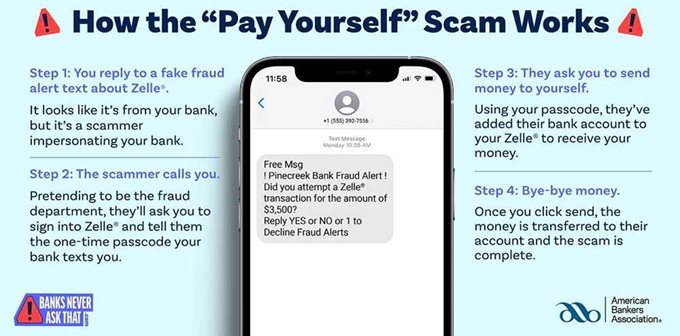Peer-to-peer (P2P) payment networks like Zelle and PayPal have transformed the way we send and receive money. However, these platforms have also made it easier for scammers to target unsuspecting victims. One of the most common fraud tactics today is the "Pay Yourself" scam, which can be especially deceptive. By staying informed and taking a few proactive steps, you can protect yourself from these scams and monitor your accounts more effectively.
How "Pay Yourself" Scams Work
A "Pay Yourself" scam typically begins when a fraudster impersonates your financial institution. They might contact you via email, text, or even phone, claiming there's a fraud alert on your account and that they need your help to resolve it. They may pressure you with a sense of urgency, telling you that you need to act quickly to avoid losing your funds. Once you bite, you’ll get a call from the scammer.
P2P transactions send a one-time security code for identity verification. The scammer will tell you that in order to protect your money, they need you to tell them the security verification code to "verify your identity".
Once they have the code, they will use it to set up their own P2P account linked to your contact information. They will then have you send money to an email address they provide, disguised to look legitimate like “yournameP2Pdispute” under the ruse that you are protecting your own funds.
Remember, your legitimate financial institution will never ask you to send money to yourself. If you get a call or message about fraud on your account, don’t respond. Instead, call your institution directly by dialing the phone number listed on their website to inquire about the fraud alert. Never use a phone number, website, or link provided in a fraud alert.

Key Signs of a "Pay Yourself" Scam
- Urgent messages: The scammer will often create a sense of urgency, claiming your account is at risk and you must act immediately.
- Requests for security codes: No legitimate financial institution will ever ask you to share security codes via email, text, or over the phone.
- Phone numbers or links that don't seem right: Always double-check any contact details provided in the message. Fraudsters may provide fake numbers or links to trick you into giving away personal information.
- Unusual instructions: Scammers may instruct you to send money to an email address or phone number. Remember, your institution will never ask you to send money to yourself to "resolve" an issue.

How to Protect Yourself from Peer-to-Peer Scams
1. Don’t Share Verification Codes
If you receive a message asking for a one-time security code, do not share it with anyone. Financial institutions like Credit Union of Denver will never ask for this code verbally or via email. If you're unsure about a message or phone call, hang up and call your credit union directly using a phone number from the official website.
2. Monitor Your Accounts Regularly
Regularly checking your account activity is crucial. Scammers often act quickly, so spotting unauthorized transactions as soon as they occur can help you stop further damage.
3. Set Up Account Alerts
One of the most effective ways to stay on top of your financial activity is by setting up account alerts. Credit Union of Denver offers alerts for various types of transactions, such as withdrawals or transfers. Here’s how to set them up:
Desktop:
- Navigate to the “Preferences” tab
- Click “Notifications”
- Select the alerts you wish to configure like withdrawals, P2P transactions, etc.
- Toggle the individual settings you wish to configure like threshold limits.
Mobile:
- Navigate to the “More” tab
- Select “Preferences”
- Select “Notifications”
- Select the alerts you wish to configure like withdrawals, P2P transactions, etc.
- Toggle the individual settings you wish to configure like threshold limits.
Video Guide
Peer-to-peer payment services are convenient, but it’s important to recognize the risks and take actions to protect your money. By setting up account alerts and understanding how scams like this work, you can protect your funds and prevent fraud. Being cyber-smart about your P2P will help keep your money safe where it belongs—with you!